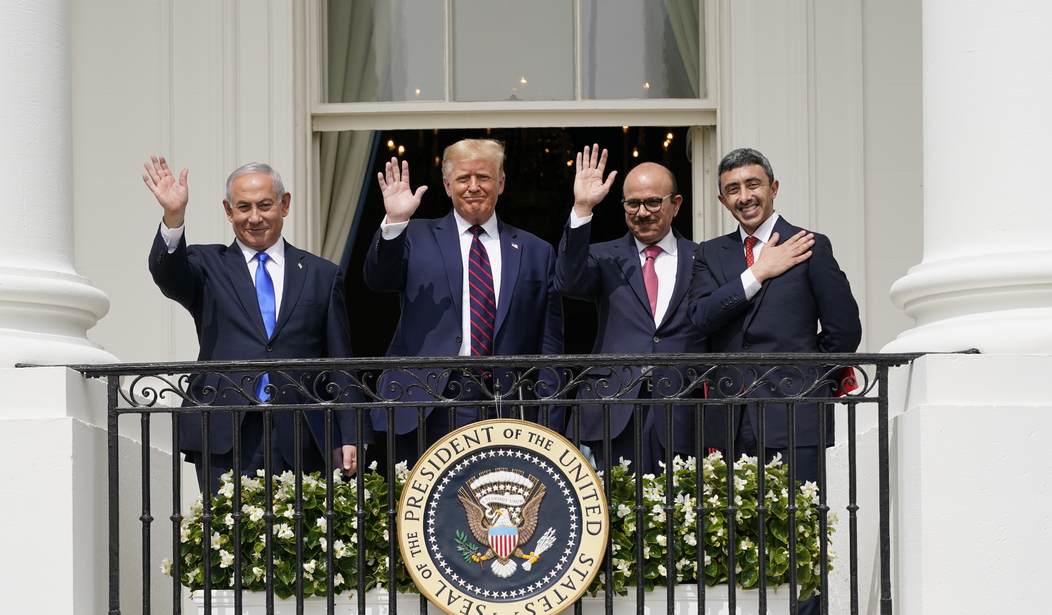House Speaker Nancy Pelosi had a dreadful response to the Abraham Accords, a peace deal that normalizes relations between Israel and the United Arab Emirates (UAE) and Bahrain. Her statement expresses concern over the agreement to provide the United Arab Emirates with F-35 fighters and reemphasized the Democrat’s insistence on a two-state solution. Of course, the Democrats’ public relations staff in the media are similarly playing down and even criticizing the agreements.
As an idiotic example, NPR ran with the idea that the deal is not a breakthrough because it did not include the Palestinians. Perhaps NPR misunderstood the strategy. As Arab nations agree to recognize and normalize diplomatic and economic relations with Israel, the Palestinian National Authority is isolating itself. The Palestinians are insulting nations who have given the PNA billions in aid over the last 70 years by burning pictures of their kings and other offensive displays.
Peace between Israel and the Palestinians would require a change in leadership, according to Joseph Levine, an Israeli author, translator, and localization specialist. He advises companies and the Israeli government to craft messages that are suitable for communication with different countries and cultures.
While Twitter is often a terrible place, I crossed paths with Levine there about five years ago. He has been tutoring me on the politics of the Middle East for the last five years. He is kind enough to appear on my podcasts to walk me and my listeners through the complex issues in the region and explain things most Americans are not familiar with, such as Israeli elections.
The Trump Peace Deals Won’t End the Jihad Against Israel, But They Help
Following the formalization of the Abraham Accords and the statements from Pelosi and various talking heads, Levine had a few thoughts for Democrats and the press. First, these accords are historic precisely because they required Israel to concede nothing. A two-state solution is not on the table.
Answering Pelosi’s concern about the military equipment, he said it was publicly positioned as a bone of contention, but Israelis generally are not concerned. The citizens have a high degree of confidence in their military and do not see the UAE as a threat for geographic and historical reasons.
Levine also shared details about why Israel’s Arab neighbors may be interested in normalizing relations that Americans may not understand. First, Bahrain has a significant freshwater problem. Israel has been desalinating water since the 1970s and has sophisticated technology to provide fresh water to support its population. Normalizing economic relationships will allow a technology transfer that the island nation desperately needs.
He goes on to add that this may be a significant motivator for other Arab nations to follow suit. President Trump hinted additional agreements were pending during his speech on the accords. Levine speculates that the individual agreements are being rolled in a particular order for strategic reasons.
The second motivator for Arab nations that want to develop and maintain modern economies is the idea of a post-oil economy. The United States has already become energy independent under President Trump. Levine thinks this has caused the Arab nations who depend on oil for revenue to take a different view.
The Magnetic Genius Behind the Branding of the Abraham Accords
Additionally, according to Levine, Hebrew University is leading the research into nuclear fusion. Fusion would theoretically be cleaner, less dangerous, and produce more energy than nuclear fission, which powers plants today. He believes that by 2030, nuclear fusion or other innovative technologies will make oil and gas mostly obsolete. If that happens, Israel will become the leader of the post-petrol economy in the region. Normalizing economic relations will assist fossil fuel-dependent nations in making this transition.
When asked about the presidential election in the United States, Levine said a change in the presidency here could put these new accords at risk. During the Obama administration, Israel made a turn towards China and Russia. In the Sunni-Shiite conflict that persists, the United States reentering the Iran Nuclear Deal could destabilize the region.
You can listen to Joseph’s full comments on the Abraham Accords in hour two of the podcast below:










Join the conversation as a VIP Member